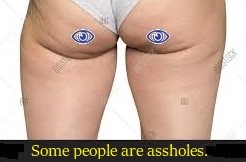Each person is a Judge of The World and every day is Judgment Day
"Ask what your country has done for you, before asking what you can do for your country." (¬JFK)
"Only our concept of Time makes it possible for us to call the day of the Last Judgment by that name; in reality it is a summary court in perpatual session. For man is is always already the day of the Last Judgment: the Last Jugment is his normal historical condition and only his fear of facing it creates the ilusion that it is still to come." ("Reflections on Sin, Pain, Hope and the True Way", Franz Kafka, quoted in Giorgio Agamben, "The man without content", p. 113)
I begin here by repeating a quote from the psychoanalyst Melanie Klein which I feel both defines the hope for living, at least as far as I myself am concerned (and you, my reader?), and also damns everything which does not contribute to same:
"Enjoyment is always bound up with gratitude; if this gratitude is deeply felt it includes the wish to return goodness received and is thus the basis of generosity. There is always a close relation between being able to accept and to give, and both are part of the relation to the good object [prototypically, the nurturing mother] and therefore counteract loneliness. Furthermore, the feeling of generosity underlies creativeness, and this applies to the infant's most primitive constructive activities as well as to the creativeness of the adult." (Melanie Klein, Envy and gratitude and other works, 1946-1963, 1975, p. 310)
I did not ask to be born. What do I owe to the people who wanted me here if they do not earn it by nurturing me and providing me with a richly fulfilling and joyous life? Ex nihilo nihil fit (Nothing begets nothing).[1] On the other hand, why would I not want to give back in joyous creation if I had been richly and creatively given to, to nurture me to become a creative person? In that case. the giving back would also be giving me even more, because, as Plato says: friends have all things in common, and good company is itself a source of pleasure, in part because of the pleasure I can receive in appreciating I have given you pleasure, when I am not burdened with the pain of losing anything I need or want. Selfishness is miserable, like King Midas. Altruism is enjoyable only for persons who enjoy self-sacrifice (martyrdom).
To cut to the chase: Every perception is a judgment of what is perceived, including: Is it friend or foe? I love my coffee cup. But if it suddenly explodes: was all the time, secretly, an Improvised Explosive Device (IED), what should I think and feel of it then, perhaps from a bed in an Intensive Care Unit (ICU), if I am still there at all? Does this thought monopolize my waking hours? No. Are such thought always in my peripheral field of experience? Yes. And you, my reader?

Conclusion: Every day – better: every moment – is Judgment day, and each person – Everyman, woman, child and other, per the Medieval morality play – is a Judge of The Whole World. People in positions of power, if they have not met the criteria, should all quiver in their boots, and, sometimes, they do: when the powerless revolt. I think the Krostadt Rebellion is a model for all social institutions: Both the sailors' ethical initiative and the Bolshevik State crushing them by brute force. "By their deeds you will know them." (Matt 7:16)
This can be stated another way, as a logical proposition:
For all X where X is a human person, For all Y, where Y is anything whatesoever, was X made for Y, or was Y made for X?[2]
Of course , implementing this ideal is not simple. In past it may have been intractable, before advanced technology (first of all, in "The West") enabled machines not persons to do an increasing proportion of "necessary labor", i.e.: repetitive drudge work to reproduce individual and species life, as opposed to freely selected activities and/or passivities:. On the other hand, the problem becomes worse than linearly more complex, the more concurrently living persons' lives need to be provided for and coordinated. A house cat sleeps or plays or just watches the world go by, for most of its fluffy life. Neither do house cats normally agglomerate into [lower case:] masses/crowds. Does any human person deserve less than such individuality?
The Polish industrial sociologist, Jan Szczepanski's magisterial essay: "Individuality and society" is indexical here. It defines a constructive and entirely practicable goal for all human existence which is unsurpassable, because it is the project of always surpassing itself. Why shouldn't every human organization should implement that goal beyond all goals? It defines an ultimate win/win solution to the meaning of life and the structure of society. All anybody needs to do is to foster everybody's creativity to the max. A journety of a thousand miles begins with a single step.
A master craftsperson making masterworks is a happy camper, or at least a freely passionately engaged one[3]. Th Biblical Book of Genesis says G-d judged His creation to be good. If man was made in the image of G-d, is the the deductive inference obvious, my reader? bmcc.edd@gmail.com
The Last Judgment
"I am the Lord your God. I will judge you on your deeds wheh your life is done. You, of course, may judge Me, too, but with the difference that you will not have the power to carry out your verdict." (BMcC[18-11-46-503])
I look at Renaissance paintings of "The Last Judgment", and what I see is a hoard. TMTC (Too Many To Count). Where's Waldo?
My image of The Last Judgment is a high and very solid judges bench, with several very stern figures sitting there, like God and maybe my cat Nibble. They do not play games.
One by one, each person who has ever lived, including those whose bodies have been vaporized, as at Hiroshima, comes before The Court and pleads his, her or other's case, in answer to one question: "Where should you spend eternity?" The judges have each one's complete dossier and they fluently speak every language; there's no hiding anything.
Each person enters on the left and leaves out the right, after the judges issue their summary judgment which is always unanimous and from which there can be no appeal: Heaven or Hell (or nothing?). We do not see from whence the defendants came nor whither they are going. That's all off-stage.
As I think about it now, I speculate that each person gets a custom tailored destiny. Thus, if Homer Simpson goes to Heaven, he spends eternity happily stuffing his face with Dunkin Donuts with sprinkles and the other good things of his good life; if Homer goes to Hell, maybe he gags for all eternity on a Dunkin Donut with sprinkles stuck in his throat. Who knows? If a scholar who spent their whole life studying modern art goes to Heaven, maybe it's a Kandinsky painting made real; if they go to Hell, maybe they get to be forever hacked apart in a Francis Bacon painting made real, i.e., as a living carcass on a Smithfiend Foods hog disassembly line. Again, who knows? But the only crowds would be for those whose Heaven or Hell would be to be a member of a crowd, and those others whose Heaven was social distancing but they end up going to the other place. Again, all that's off-stage.
The Audience? I don't see any, but The Grim Reaper and The Four Horsemen of the Apocalypse, and their support personnels might take their coffee breaks watching the proceedings, if they didn't have to use the loo? For them, and for morticians and hospital pathologists, there should be no surprises.
Prejudiced versus judgmental
Prejudiced people are threats to civil society and to all beings. They believe stuff they have been fed by their social surround and act on it without critically analyzing it: they pre judge. What they do is the luck of the draw of whatever birth canal they came out of when. That is intolerable because the rest of us have to put up with these people: They impinge on and harm us. Like the one of them who decapitated a public school teacher in Paris France, 16 October 2020, for teaching freedom of thought instead of Allah is The Only Thing in a public school classroom: Samuel Paty was beheaded by Abdoullakh Abouyedovich Anzorov → Mr. Paty's head was separated from his torso by this prejudiced person. Fortunate for us even though not for Mr. Paty, this religious bigot was put out of our misery by the police within a few hours,19 years (18 years + 9 months in utero) too late.
It is important to be judgmental: To critically evaluate your social surround and try to evaluate one's own evaluative process which was probably vitiated by the very conditions one is trying to assess, and then, weighing the evidence, to judge it: Does it deserve to exist or not? Is it doing what it could and should be doing for you? If not, what not and why not? You may not be able to do anything about it, but at least you can be aware of what you are stuck with in that case, instead of just being a 2-legged sheep obliviously being led to slaughter by 2-legged Judas goats (your parents, teachers, preachers, work managers and others). Judico ergo sum.
Your thoughts, my reader? bmcc.edd@gmail.com.
Footnotes
- ↑ Hard conditions do not generally produce gracious persons: Joseph Stalin ("Man of steel")'s early life was harsh.
- ↑ There is, of course, an obvious exception here, namely: When X and Y are both human persons. Then X and Y can either be made for each other, or mutually disjoint, although, in reality, there are many asymmetrical interpersonal relations where one person deploys another person as an object, e.g.: citizens of a nation state being deployed as "food for powder" in the nation state's wars, employees of an employer being bossed around for purposes that are meaningless to themselves to pay the bills, pupils of a teach being graded like slabs of beef, children of domineering parents being coerced to "behave", et al. To repeat: Friends have all things in common. Friends do not fire artillery shells at each other. Friends do not boss each other around. Friends go not grade each other. Friends to not command each other to obey. Or do they? The key here is always an "Or else!": Friends do not threaten each other with "Or else!" "consequences", or do they? Take away the Or else!" and the asymmetrical social relations collapse, because who would obey what they do not have to obey, as opposed to doing what makes sense to themselves, perhaps in collaborative endeavor with others?
- ↑ Some artists, for various reasons, wish to burn all or parts of their work, but, even then, it is their work and they freely want to burn it, not some asymmetrical overlord coercing them to do it, or them coercing somebody else to burn their [said other person's] work.

 Welcome
Welcome

